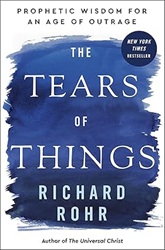Prophetic Wisdom for an Age of Outrage
by Richard Rohr
Convergent Books, 2025. 173 pages.
Review written July 5, 2025, from my own copy, purchased via amazon.com
Starred Review
Richard Rohr has done it again! His latest book helps me see the prophets with new eyes – and see how the themes speak to us today.
Since prophets are looking at injustice and suffering, of course they’re applicable today, and give Richard Rohr gives us insights for approaching those things. I like the way he points out a pattern of growth in the prophets:
My favorite thing about the prophetic books of the Bible is that they show a whole series of people in evolution of their understanding of God. Like most of us, the prophets started not only with judgmentalism and anger but also with a superiority complex of placing themselves above others. Then, in various ways, that outlook falls apart over the course of their writings. They move from that anger and judgmentalism to a reordered awareness in which they become more like God: more patient like God, more forgiving like God, more loving like God.
I love that he points out that God’s abundant love and compassion is found over and over again in the Old Testament, and yes, even in the prophets.
The title of the book comes from a quotation from Virgil, which he expands on in the first chapter:
Prophets and mystics recognize what most of us do not – that all things have tears and all things deserve tears. They know that grief and sadness are doorways to understanding life in a non-egocentric way. Tears come from both awe and empathy, and they generate even deeper awe and deeper empathy in us. The sympathy that wells up when we weep can be life-changing, too, drawing us out of ourselves and into communion with those around us. This is continuously exemplified in the writings that we have received from the Hebrew prophets.
So the prophets begin by looking at what’s wrong with the world. They don’t flinch from the truth of the world. But Rohr emphasizes that they don’t stop there.
By following the prophets’ full journey from anger to sadness and beyond, we can mature in belief, as they had to do themselves. All the prophets started with anger, or even rage, at all the right things: injustice, oppression, deceit, misuse of money, power, even religion itself. But with only a couple exceptions (Nahum and Obadiah, who remained angry), they did not stop there. They were not just reformers; they were also mystics who were captivated by the wholeness and beauty at the heart of reality at the same time as they were confronting injustice. I hope to make those distinctions clear in this book. We miss the point when we confuse prophets with mere liberal humanists.
That gives you an idea of where the author is going with this book. He claims that for a mature prophet, it’s all about God’s unconditional love – and the journey to get us there presents ideas I’d never considered before.
My church went through this book, using it as a springboard for three meetings of “holy conversations.” We didn’t really study the book, but it got us talking to one another in fascinating ways.
I recently finished going through Richard Rohr’s book The Universal Christ with my small group, and we all agree that his books are not light reading, but they’re full of good things. This book is the same. He is a mystic, and his books are filled with mysticism, and my rational mind can’t always keep up. But I do know that I like the way he gets me looking at the world. And I love his affirmations of God’s love – even though the world is full of tears.
Find this review on Sonderbooks at: www.sonderbooks.com/Nonfiction/tears_of_things.html
Disclosure: I am an Amazon Affiliate, and will earn a small percentage if you order a book on Amazon after clicking through from my site.
Disclaimer: I am a professional librarian, but the views expressed are solely my own, and in no way represent the official views of my employer or of any committee or group of which I am part.
What did you think of this book?
